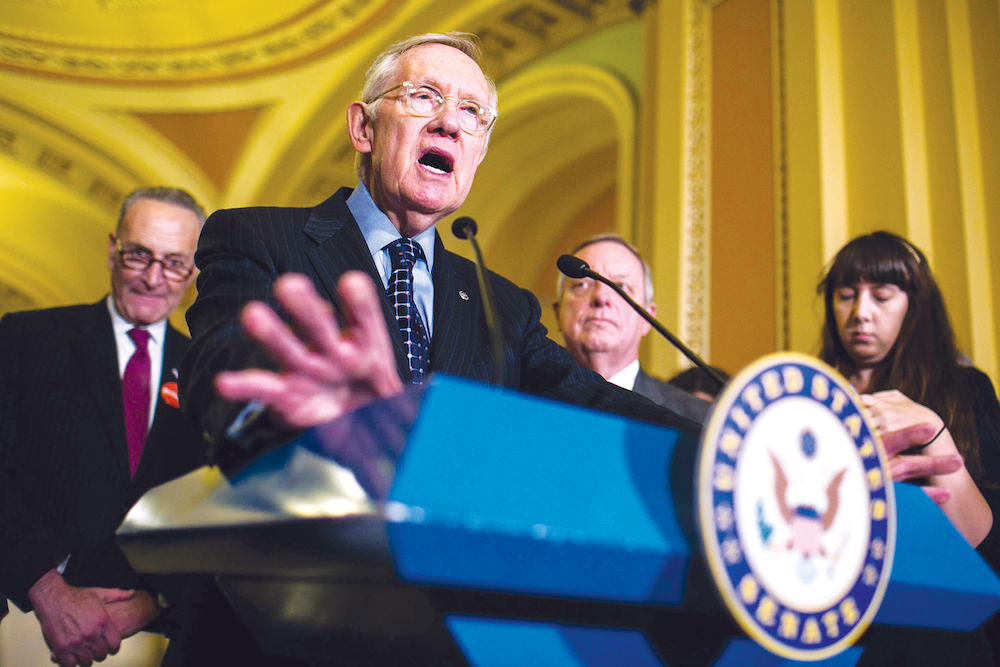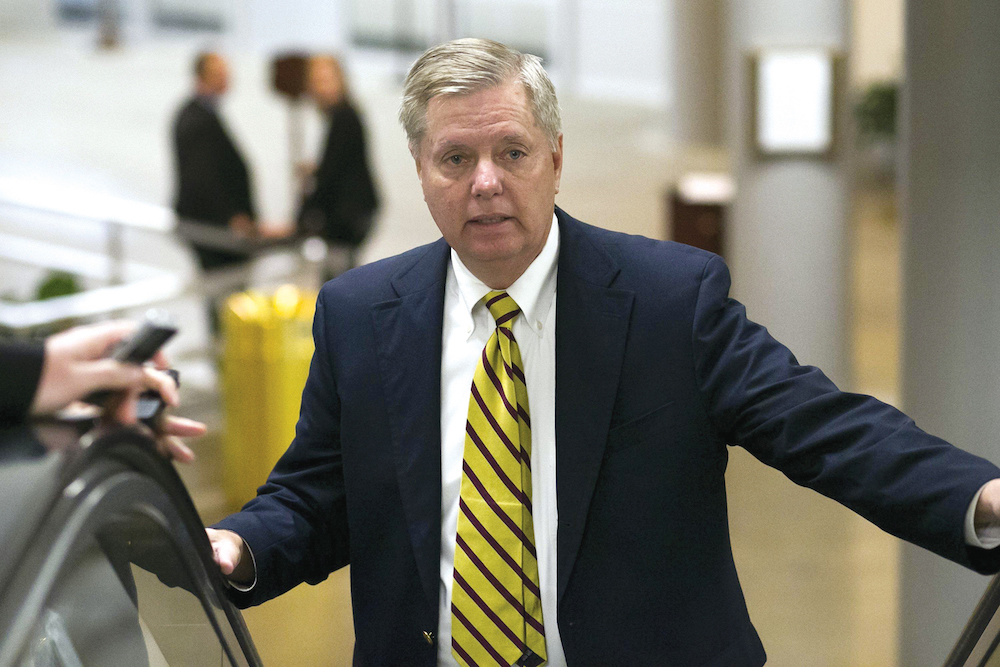Republicans’ refusal to consider any justice nominated to the Supreme Court by President Obama is setting up the possibility of radical rule changes that would dramatically alter the Senate next year.
At their heart could be the final end of the filibuster, a move that some call “the thermonuclear option.”
Republicans say the next president, not a lame duck, should nominate the replacement for Justice Antonin Scalia, who died last month. Democrats say it’s Obama’s constitutional right.
And whichever party controls the Senate in 2017 could eliminate the rule that allows the minority party to filibuster Supreme Court nominations — that is, talk about them until they die.
The fallout could be radioactive. It wouldn’t affect the Senate’s ability to pass general legislation, but it would limit a minority’s ability to stall the next president’s high court picks.
It’s not just about Scalia’s replacement. The court has three justices in their late 70s or early 80s. With the filibuster gone, the next president could choose the next four justices, a number matched only by Richard Nixon in the past half century.
Advancing high court nominees by a 60-vote supermajority has been the Senate standard for nearly four decades, and before that, there was an even higher 67-vote threshold. Depending on the partisan breakdown of the Senate, the minority party could retaliate by filibustering key bills or placing time-consuming holds on other judicial and executive nominations, hobbling the process further still.

Whichever party controls the Senate in 2017 could eliminate the rule that allows the minority party to filibuster Supreme Court nominations — that is, talk about them until they die. (AP Photo)
Obama in late February predicted this disagreement could poison the well for all future presidents.
“Invariably what you’re going to see is further deterioration in the ability of any president to make any judicial appointments,” he said. “The Supreme Court, as well as the federal bench, suddenly becomes a complete extension of our polarized politics.”
Few people would disagree with this except for the word “becomes,” for it is clear that partisan fights to shape the ideology of the court have been with us for at least since the destruction of Judge Robert Bork’s nomination by Sens. Joe Biden and Ted Kennedy in 1987.
Longtime observers say the two parties are already so fiercely divided over replacing Scalia that by next year each party will be determined to force through their own preferred candidate or block their opponents’ pick.
“There is a possibility of a filibuster either by Democrats or Republicans, whoever is in control of the Senate,” said Illya Shapiro, editor in chief of the Cato Institute’s Supreme Court Review. “If that were to happen, it’s likely that the filibuster would be eliminated by either side.”
Senate Democrats already killed the filibuster for lower court and executive branch nominations, in a move called the “nuclear option.” Sen. Harry Reid, D-Nev., who was majority leader at the time, detonated it in 2013, which Shapiro says is a token of what Democrats would do to Supreme Court filibusters if it got them the court they wanted.
“Republicans would do it because the Democrats have done it already,” Shapiro said. “What’s good for the goose is good for the gander.”
Either way, “I don’t think the filibuster is long for this world.”
Senate Democrats are sticking to their talking points, pressing Senate Majority Leader Mitch McConnell, R-Ky., to abandon his refusal to allow a vote on any Obama nominee.

The extent of Democratic retaliation next year depends on how McConnell treats Obama’s nominee this year, according to Jim Manley, former senior adviser to Reid. (AP Photo)
“There are so many variables in the equation, I can’t predict at the moment” what would happen with the Senate rules, Sen. Sheldon Whitehouse, D-R.I., told the Washington Examiner. Whitehouse was his state’s attorney general from 1999 to 2003 and now serves on the Judiciary Committee.
“I think that the public pressure on the majority leader and the unprecedented and bizarre nature of what he has proposed is such that we won’t get to that,” Whitehouse said. “My prediction is [McConnell] collapses before the election, particularly if this becomes an issue for senators who are up” for election in November.
So far, Republicans show no sign of capitulation. They say it’s payback time for Reid.
“‘I told [Democrats back then] if you did this … you’ll pay a price with me,’ ” Sen. Lindsey Graham, R-S.C., told reporters last month, referring to Reid’s nuclear option. “I drew a red line and I actually meant it.”
Sen. Tim Kaine, D-Va., dismissed the notion that both parties are escalating their nuclear arms race and that Democrats are getting their just desserts for 2013. He points out that Republicans did not restore the filibuster when they regained the majority in 2015.
“If they didn’t like it, they could have changed it Jan. 3,” he said. “They weighed very carefully for a variety of reasons whether they wanted to go back or not, and they frankly decided they liked this better.
“The American public believes they should do their job and have a confirmation hearing and have a vote. Predicting what might happen down the road if they don’t cave, that’s kind of too hypothetical for me.”
The extent of Democratic retaliation next year depends on how McConnell treats Obama’s nominee this year, according to Jim Manley, former senior adviser to Reid.
“If McConnell doesn’t even allow the Judiciary Committee to hold a hearing on the nominee, all bets are off on what happens in the future,” he said.
Two-week window
If a Republican wins the White House in November and Democrats win back the Senate, they would have a two-week window in early January in which they could kill the filibuster and push through Obama’s preferred nominee before the new president takes over. Manley wouldn’t say if that could happen, but signaled that all options are open.

Senate Democrats already killed the filibuster for lower court and executive branch nominations, in a move called the “nuclear option.” Sen. Harry Reid, D-Nev., who was majority leader at the time, detonated it in 2013. (AP Photo)
One senior GOP Senate aide cautioned that he didn’t think either Obama or Democratic leaders would be that bold under a January last-ditch lame-duck scenario.
“I doubt even Obama would be that brazen,” the aide said optimistically. “He wants to be seen positively in history and this would sink that.”
Others aren’t so sure. Obama’s willingness to seize openings regardless of precedent is already established, and packing the court with one more liberal jurist might be too good an opportunity to pass up.
The same night Scalia’s death was announced, a Democratic elections blogger known as Taniel, who has written for the Daily Kos Elections website, suggested such a course of action.
“There is a 2-week window in which Obama’s presidency will coincide with 115th Congress, which may have a Democratic Senate,” he tweeted that Saturday night.
Taniel’s idea is not far-fetched given the daunting challenge the GOP faces in seeking to retain its Senate majority.
Republicans are defending more than twice as many seats as Democrats are. Only two Democratic seats are in competitive states, while more than half a dozen GOP incumbents are clinging to seats in battlegrounds Obama won at least once.
It’s likely that Supreme Court politics will remain so fierce next year that Republicans would oppose any new Democratic nominee.
“The question is whether Hillary goes for a moderate choice like [D.C. Appeals Court Judge] Sri Srinivasan? Would he be subject to a filibuster? I don’t think so,” Shapiro said. “But if Hillary is the president and has a Democratic Senate, there is a great likelihood that she would go for someone more controversial that Republicans would want to filibuster.”
On the other hand, Democrats could gain enough Senate seats to block a Republican president’s choice to replace Scalia.
“The partisanship is not going anywhere, so I assume Republicans would mount a filibuster [of a Democratic president’s nominee next year], but I’m not sure they would have the votes to be successful,” Manley said.

Graham said he didn’t believe either side would be able to block the high court choice of a newly installed president who likely would come in with a mandate. (AP Photo)
Graham also predicted some Republicans would try to filibuster whomever a Democratic president, most likely Clinton, would send them, but said his GOP colleagues cannot count on him to support such a move.
“Elections have consequences,” he told reporters. “So if [Clinton] nominated someone who is qualified, like Supreme Court Justices [Sonia] Sotomayor or [Elena] Kagan, I’m going to vote for them.”
For the same reason, Graham said he didn’t believe either side would be able to block the high court choice of a newly installed president who likely would come in with a mandate.
“If the Republican Party filibusters a qualified nominee sent over by Hillary Clinton, the public won’t stand for that because she’ll be a new president, and new presidents get to pick,” Graham said.
If a Republican wins the White House and Democrats try to block a new GOP president’s high court choice, “they’ll be in the same boat,” he said.
The fact that both sides are thinking about filibusters in 2017 shows how low high court politics have sunk. Republicans say Obama set the tone by backing a filibuster of Justice Samuel Alito’s nomination in 2006.
The White House said Obama regretted that vote, in which Obama joined 24 senators who tried but failed to keep Alito, one of President George W. Bush’s picks, from joining the highest court in the land.
The only time the Senate successfully filibustered a high court nominee was in 1968, when there was a bipartisan effort that prevented President Lyndon B. Johnson’s elevation of sitting Supreme Court Associate Justice Abe Fortas to the position of chief justice.
